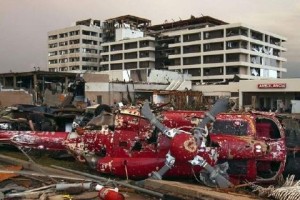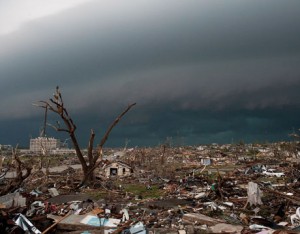“When the Sirens were Silent” – rehashing old fairy tales?
Mike Smith has a new book out – “When the Sirens were Silent” – where he talks about the tornado disaster in Joplin, where 161 people were killed, because, Mike seems to say, they didn’t heed the warning sirens that blared as the twister was coming, and then he blames the system. Because, as we all know, we should never have to take responsibility for anything, ever.
Mike’s new book has gotten quite a bit of attention, from such places as the Washington Post, BS and other places, and some very nice reviews around both the internet and printed publications. While there can be no doubts about Mike’s qualifications when it comes to weather (he’s a meteorologist, has his own company in the field, is a member of some nice societies and teaches people about the stuff), there are a few other problems with his book.
The Problems

Mike knows weather, but he’s apparently less attuned to the way man and machine works together – or at times against each other. The problem for Mike is false alarms. False alarms, he seems to claim, has “trained” the citizens of Joplin to not react to the real warnings as well, making them think that there’s simply nothing to be afraid of. This is a very, very common problem – when was the last time you reacted to a car alarm by thinking some car was actually being stolen, for example – but it’s less of a machinery problem than a real life, human problem.
Blaming the system for your own lack of reaction to that system’s execution of its man made instruction is nothing more than denying responsibility for one’s own lack of action in the face of a clear warning of danger. And yes, I know – that sounds cold. Freezing, actually. There’s really not much I can do about that, since it’s true.
Mike may not be as impartial as he would like us all to believe. He has his own company – AccuWeather – and he spends some of his words bashing the federal weather services, pointing out that he thinks they rely too much on computers and “logarithms”, while his own company, he says, avoids that same “mistake”. He is the head of a company that is in direct competition with the people who made the current warning system. That should be a warning lamp to you.
Misleading the reader is also a problem that Mike should look into. In fact, the siren’s weren’t silent in Joplin on that day – they sounded twice and about 25 minutes apart. Residents were warned of the impending disaster, but the residents chose, to an extent, to believe that the sirens somehow weren’t “real”. The sirens sounded with at least 24 minutes of warning before the tornado struck, which is twice the time you can expect in any case, providing plenty of time to get out of Dodge, as it were.
Old Fairy Tales?

We all know the story of the boy who cried wolf. That’s fine. The Joplin disaster has been blamed on the tendency of people to ignore the real warning when it follows a series of false such, false alarms and whatnot. While it’s a valid premise, and false alarms should be avoided as much as humanly (and “machinely”) possible, there’s really no excuse for letting the real warning pass by without action, just because you “think” it may be another one of those pesky fake ones again. It got the boy in the wolf story killed, and it will likely get you hurt or killed as well.
Mike Smith’s book is worth a read, and it reads quickly too, which is a huge plus. Mike has a way of being forward and easy when it comes to explaining the technical terms that invariably comes up when scientists talk about weather, and a 65-page paperback shouldn’t be daunting to anyone over the age of 8. Worth a look, but looking at other sources than the main competition to the NWS is highly recommended.

Thanks for the review, but did you actually read the book?
This reads like a re-hash of some of the reviews at Amazon where the reviewer’s spell checker incorrectly turned “algorithm” to “logarithm.”
“Sirens” contains one sentence about AccuWeather correctly warning of the tornado. It was included for two reasons: To demonstrate the book is not “Monday morning quarterbacking,” — that the tornado was effectively warned of with the right techniques — and to answer the inevitable question, “How did your company do?”
In no way is AccuWeather in competition with the NWS when it comes to tornado warnings. We want the NWS warnings for the public to be as accurate as they can be.
Second, the book does not contend that the sirens didn’t sound. It reports on both activations.
The first activation caused more harm than good (because when people turned on the TV they would told the storm was going to MISS Joplin) and the second wasn’t until the tornado was flattening homes — and then the sirens were turned off as the storm crossed Joplin. When they were needed most, the sirens were silent.
The book was written to document the facts surrounding the Joplin tornado with a goal of insuring this type of tragedy never occurs again.
Hi Mike.
First off, thanks for your comment, and for reading the review.
Along with actually reading the book, I’ve also read some of the other reviews that have been written on it, but as far as rehashing those without reading the book itself? That would be unfair to all. Logarithm is a valid mathematical term, by the way, and those thingies are also used in weather forecasting, as I’m sure you know.
When it comes to my point about impartiality and AccuWeather, I still think that is valid. It’s true, as you say, that AccuWeather correctly predicted the tornado, but most of the mentions of your company (of which there are quite a few) read like advertisements. The first mention is already in the introduction to the book, where AccuWeather’s role to both “railroad moguls and homemakers” is emphasized. Further mentions include the no doubt outstanding employee of AccuWeather, Kate Danna, and the use of AccuWeather’s “unique displays” for viewing storms. I have no doubt that they are, and that your company’s service is outstanding, but I feel that pointing out the possible conflict of interest is warranted when those mentions are wildly positive, while the mentions of the NWS are exceptionally negative and critical.
I’m not saying that you don’t address the siren activations. I’m saying that your title is misleading. That’s all. When I first saw the book, I was shocked, since I thought you were going to address a situation in which the Joplin residents got no warning. In fact, they had a lot of warning.
There are also some other inconsistencies in your text, such as your advocacy for using sirens in life threatening situations (mentioning a “fatal, non-tornadic windstorm” at one point) and then going on to contradict that exact sentiment at other points by reserving the sirens for tornadoes.
But enough about that. I thought your book was absolutely worth the read, and every dollar the Kindle edition cost. What I am in fact reacting in a negative manner to, is the impression that this massive and infinitely tragic loss of lives should have been prevented by some higher power (i.e. a government on some level), while individuals just didn’t know any better, and couldn’t have done anything to help themselves.
It’s my sincere belief that individuals (and I also mean family units) should take responsibility, prepare themselves, and treat every “cry of wolf” as the real deal. No, you don’t have to dial 9-1-1 every time a car alarm goes off, but what about peeking out the window? I hope you get my simile there.
I also think it’s absolutely fantastic that you’ve included some readiness advice (and good readiness advice at that) at the end of the book. Getting that information out to the people is also some of what we do here at SB, and it’s much needed. What I do think is that people need to start taking some responsibility for themselves, preparing and taking action when danger arrives, and not necessarily rely on agencies and governments to hold them upright. Proper preparation, proper attention and proper action would have saved a lot of lives in Joplin.
Also, the 80% lack of basements is shocking to me. I would never live in a house without one, and certainly not in a trailer, unless it had some massive anchors.
Thanks for reading the book, I now I have a clearer idea where you are coming from.
Just a couple of followup points:
“the mentions of the NWS are exceptionally negative and critical.” They are. If you read my first book, “Warnings: The True Story of How Science Tamed the Weather,” you will read great praise for the NWS which they deserve a surprisingly high amount of the time. However, they did a poor job with the Joplin storm and was “calling it as I saw it.”
Second, I’m a huge advocate of watching out for oneself during extreme weather, thus the advice and lift-out safety rules (paperback version). However, in this case, the tornado was literally invisible to its eventual victims because it was wrapped in rain. This made the population legitimately more dependent on the warning system. The NWS kept telling Joplin the tornado was going to miss to the north and the sirens were off when they would have done the most good. We pay our tax dollars to have a warning system and I believe we are entitled to its best efforts.
Thank you again for the review!
Well, I’m all for calling things as you see ’em – and now I wish I had the print version of your book, just to see those lift-out safety rules.
Anyway, I’ll most definitely pick up a copy of your other book when I get a chance. Thanks again for reading and commenting!